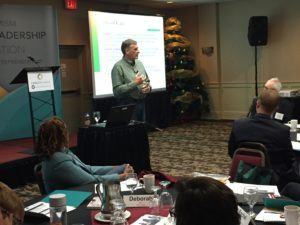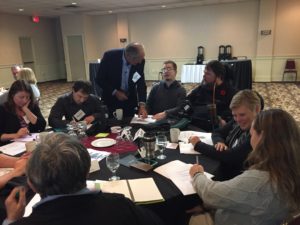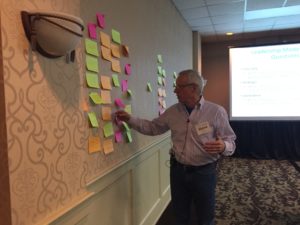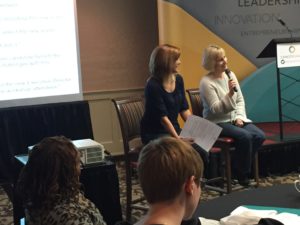Al Mills says he’s ready to help make some changes at work.
But less than two months after becoming executive director of Extend-A-Family Waterloo Region, he knows that will take some time thanks, in part, to what he learned at Capacity Canada’s Manulife Board Governance BootCamp.
The BootCamp, sponsored by Manulife and held Nov. 16-18 at the Holiday Inn Kitchener-Waterloo Conference Centre, offered top administrators and board officials from a variety of charitable non-profits in-depth board governance training. About 20 non-profit groups were represented at the event, which featured an inspirational keynote address by renowned Canadian legal expert Wayne D. Garnons-Williams centred on the importance of trust and communication.
“For me, the content of the BootCamp was excellent and the timing couldn’t have been better,” said Mills, who also attended with four representatives from his board, three of whom who joined in the last six months.

“Our board seems to recognize there are things they’d like to invest in and do differently. So the five of us are going back inspired now with new ideas,” he said.
These could include restructuring the board’s committee structure and revamping the bylaws of the organization, which began in 1981 by a group of parents whose children have developmental disabilities. Extend-A-Family, which offers a wide variety of programs and supports, has a mission dedicated to inclusion and relationship building.
“We may want to take a look at our mission statement and invest in a new strategic plan,” said Mills. “But we can’t do all that next Saturday when we have our first board meeting post-BootCamp.”
Don McCreesh, chair of the Standards Initiative, who facilitated the BootCamp and many of the 16 or so held so far by Capacity Canada, said recognizing the need for change is always an important first step for those in the non-profit sector.
“They start a journey,” he said in an interview after the BootCamp. “They begin a practice every year looking at what three or four things that ‘we can now start implementing, or do differently’, and continually challenge themselves.”

For Edward Faruzel, executive director of K-W AccessAbility, the BootCamp is the ideal environment to learn some new information.
“Continued learning is really important,” said Faruzel, who attend his first BootCamp six years ago when he became executive director of the organization. K-W AccessAbility has been providing support and resources to those with physical disabilities for the past 20 years.
“The first time I attended as ED everything was brand-new for me,” he said. Now, six years later, Faruzel said there is still more work to be done.
“Coming here really made me realize that it’s very important to update and stay on top of things,” he said, noting risk management among those issues. “Risk management is something we haven’t taken a close look at in the past.”
Also, he said his board has now started to focus on a new strategic plan, along with updating its bylaws and policies.
McCreesh, who described at the start of the BootCamp the amount of information provided to participants would be like ‘drinking through a firehose’, delved into an extensive array of issues regarding the essentials of board governance. The underlying message was clear: better board governance is a necessity for the survival and sustainability of charitable non-profits.
“The world is changing around us. We’re now seeing more competition within the sector,” he said, adding the lines between non-profits, charities and social profits are beginning to blur.
McCreesh also stressed the importance of transparency.
“As a sector, we’re probably not as transparent as we could have been over the years,” he said. “You need to make sure you disclose things to your stakeholders, and the world, about what are your accomplishments.”
McCreesh also urged participants to take note of the trends taking place in the corporate world and the eventual trick-down effect it will have on the non-profit sector.
“Corporate board challenges will show up in the non-profit sector eventually,” he said.
A running theme of the BootCamp, which also included a discussion surrounding mission and strategy lead by Capacity Canada’s Steve Farlow and Hugh Munro, focused on building trust and better communication. This struck a chord with many of the participants, including Joe-Ann McComb, executive director of Kinbridge Community Association. Her organization provides help and development skills, and fosters community connections, to about 22,000 residents in south Galt.

“I really liked the piece about ‘no one goes alone into the penalty box,’” she said. “As a board, when you make a decision together, and when it gets tough, you have to stick together.”
McComb, who has attended three other Capacity Canada BootCamps since becoming ED more than a decade ago, said she relates to that kind of thinking and the notion that it’s OK to ask questions.
She said the BootCamps are a great learning experience for not only EDs, but board members.
“I can’t give them that kind of orientation,” McComb said, referring to the amount of information provided. “It shows board members how to be more professional because quite often you get people who join a board because of passion and they like the warm and fuzzy part, as opposed to professional development.”
To drive home the point of many of the issues shared with participants, the BootCamp wrapped up with two case studies via a Q&A lead by Capacity Canada’s Fred Galloway.
The first centred on the transition of leadership at Family Children’s Services Waterloo Region, which found itself looking for a new executive director.
“We had people apply from all over Canada,” said board member Lori Ann Palubeski, outlining the process for participants. “We took a very transparent approach.”
For Karen Spencer, who had been the organization’s acting ED for about nine months prior to being named to the position, she admitted it was actually more stressful to be an internal candidate due to the expectation of others.
“There was a lot of pressure on us,” she said. “But it was a really important process to go through because I would not have wanted to be appointed.”
In the end, Spencer said the transition proved to be very easy for her.
“I knew the board was very satisfied with the direction the organization was going in because they would have questioned that,” she said.
Palubeski urged participants who face a similar situation to take their time when it comes to selection process.
“You need to spend time to save time. It’s not a quick process; check your strategic plan,” she said.
The second case study presented BootCamp participants with an even larger issue and centred on Hospital Waterloo Region’s introduction of 24/7 residential services, including a campaign launch to build a new facility.

Judy Nairn, Hospice Waterloo Region’s executive director, said it was clear the time was right to make this move.
“The hospice movement in Ontario is maturing,” she said, adding the organization was already facing immense growth.
Anne Toner Fung, a Hospice Waterloo Region board member, described the process like an oncoming ‘freight train’.
“There are a lot of different pieces that come together. There’s a lot of research done,” she said, adding they are at the point that committees have been struck to deal with things like fundraising and site selection.
Nairn said from her staff’s side, a great deal of work has been done to ensure their current programming is not affected.
“We’ve been really diligent ensuring our community programs remain strong as possible,” she said, noting there can be a lot of anxiety around the expansion among some in the organization.
“But as long as you’ve got trust and can live with a bit of ambiguity, you’ll be OK.”
Participants were asked to return March 8, 2018 for a follow-up BootCamp session.

